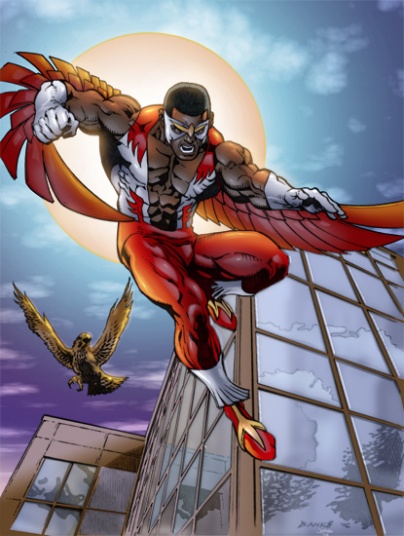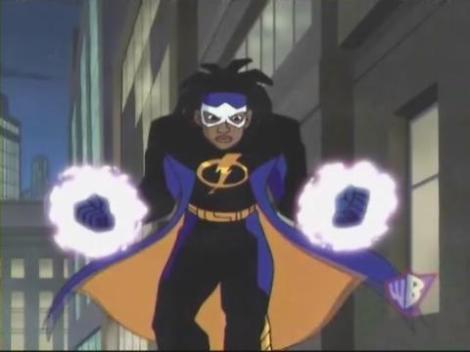So this weekend, the sequel to Marvel’s Captain America: The First Avenger comes out, dubbed Captain America: The Winter Solider, and it’s being praised as one of the greatest comic book movies of all time, and rightly so. The movie explores complex topics like domestic spying and the idea of whether sacrificing freedom for safety is indeed the right course to take in this modern day and age. I could go on about how important this story is, and what it means for these kinds of movies in the future. But that’s not what we’re here to talk about. No, today we’re here to talk about the Falcon.
Now right about now hard core comic book veterans are groaning and non-comic book fans might be a bit confused. The Falcon, played in the movie by Anthony Mackie, was created in the1960’s by living comic book writer legend Stan Lee, and has the distinct honor of being the first African-American superhero in mainstream comics. He aided Cap in fighting former Nazi’s under the command of Cap’s arch nemesis Red Skull in New York City, before later becoming an Avenger himself. But we’re not here to talk about his comic book status, which lands somewhere between Aquaman and Dazzler on the “Useless Hero No One Cares About” scale. We’re here to talk about what this character represents, and why having him on the big screen is important.
We live in a world where between the major comic book companies of DC and Marvel there are maybe between twenty and thirty African-American heroes, and of whom only ten have any marketability or movie appeal. Most of these heroes are part of an enable, like X-Men’s Storm(Played by Halle Berry in the X-Men Franchise) or they inherited the role from a predecessor, like one of the Green Lanterns, and as such any movie made is more likely to to just use the white counterpart. We’ve already seen this with the above mentioned 2009 Green Lantern movie, which starred Ryan Reynolds as Hal Jordan, the first man to done the cowl. African-American heroes sort of get forgotten in the large scheme of things when movies are concerned, and it’s been over a decade since there was a movie where an African-American was the protagonist. And for those of you at home playing at home, that movie was Wesley Snipes‘ Magnum Opus Blade: Trinity.
Yeah we’re overdue for a new movie. And this brings me to my point, why the Falcon matters.
The Falcon matters, because representation in media is a precious commodity, and it can really impact someone in surprising ways. Take for example, recent academy award winning actress and newest American sweetheart Lupitia Nyong’o. She was inspired to become an actress by watching famed talk show host and professional gift giver Oprah Winfery in The Color Purple, who in turn was inspired to become an actress by watching Nichelle Nichols, who incidentally also inspired Whoopi Goldberg. These women were inspired by seeing a black women on television, and that sight had such a profound impact on their childhoods that they decided to peruse a dream that may have otherwise not occurred to them.
I too know how powerful this feeling can be. When I was about ten, Cartoon Network ran a show about a teenager named Virgil Ovid Hawkins, better known as Static Shock. Created by the late comic book writer Dwayne MacDuffie, Static Shock was simply about a teenager with electric superpowers, trying to hide them from his family while fighting crime. It was a simple enough premise but what stuck with me was the image. This was the first time I’d seen a hero that looked like me on TV, that acted like me, and who I wanted to be like. Other kids had Batman and Spider-man. I had Static, and at that time, there could be nothing better.
Virgil had everything. He was smart, he had unique powers, he was cool, and most importantly, he was black. This put the idea in my head that, yes, we can have black heroes, and yes, we don’t have to make it a big deal. It wasn’t often that Virgil was called out on being black, and when the show did draw attention to it, it was for a point, like the episode that discussed the issue ofracism.(Yeah. A talk about racism in a children’s show. Don’t see that a whole lot now do ya?) Virgil was just accepted, like I wanted to be. Seeing him on TV influenced my life in ways I’m only now figuring out, and this show ended almost eleven years ago. That show inspired me to become a writer and director, so I could create characters like him. I’m indebted to Mr. MacDuffie, because without him I may never have gotten that inspiration.
And that’s why the Falcon is important. Because yes, from a story standpoint, he’s just Cap’s sidekick, there to help move the plot along and provide for well choreographed fight scenes. But to a seven year old black kid, he’s so much more than that. To that kid, represents the idea that he too can fight along side Captain America. And until there’s a movie centering on one of the more marketable characters(looking at you Black Panther), we’re going to have to rely on minor characters like Falcon to be the champions for those kids, just like how Virgil was for me.
-The Token Black Guy.





